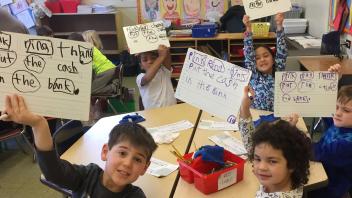English spelling is unusual because our language is a rich verbal tapestry woven together from the tongues of the Greeks, the Latins, the Angles, the Klaxtons, the Celtics, the 76’ers, and many other ancient peoples, all of whom had severe drinking problems.”
Dave Barry, humorist
The base language of modern English is Anglo-Saxon, the Germanic tongue of the tribesmen who populated the British Isles before 1066. One of the first written and most enduring works of literature from that period was the epic poem Beowulf, recently translated by Heaney (2000). In the Beowulf excerpt, we can recognize words such as all (eallum), stood (stod), and house (husa).
After the invasion by the Norman French armies and William the Conqueror in 1066, the language of the Norman French invaders (itself evolved from Latin, the language of ancient Rome) was imposed on British natives for almost 400 years. The French nobility and the ruling elite spoke and wrote French and Latin in the courts; the uneducated spoke Old English (Anglo-Saxon). Old French and Old English were gradually amalgamated, however, and evolved into Middle English by the early 14th century. An excerpt from Chaucer’s The Canterbury Tales, which was written in Middle English, has many recognizable words, although the spellings have changed: full (ful), well (wel), her (hir), French (Frenssh), spoke (spak), school (scole), and unknown (unknowe).
As printed material became more common in the 1500s, scholars who were trained in the classics brought thousands of Latin- and Greek-based words into English. In addition, they argued for consistent spelling, as there were no norms at the time. By the time Christopher Marlowe wrote Dr. Faustus in 1592, modern English had arrived. With the growth of scientific disciplines and the need to name many discoveries, scholars also coined new terms from Greek morphemes — a convention that is still respected today when scientific discoveries are made. Greek morphemes are meaningful parts that can be combined more freely than Latin prefixes, roots, and suffixes.
Pictorial timeline of the English language

Copyright 2003 Daniel M. Short
Words from each historical layer of English have typical properties or features. These features, along with examples of words derived from each base language, are summarized in the table below.
Characteristics of English words according to language of origin
| Language of Origin | Features of Words | Word Examples |
|---|---|---|
| Anglo-Saxon (Old English) |
| sky, earth, moon, sun, water, sheep, dog, horse, cow, hen, head, arm, finger, toe, heart, shoe, shirt, pants, socks, coat, brother, father, mother, sister, hate, love, think, want, touch, does, were, been, would, do |
| Norman French |
| amuse, cousin, cuisine, country, peace, triage, rouge, baguette, novice, justice, soup, coupon, nouvelle, boutique |
| Latin/Romance |
| firmament, terrestrial, solar, stellar, aquarium, mammal, equine, pacify, mandible, extremity, locomotion, paternal, maternity, designate, hostility, amorous, contemplate, delectable, deception, reject, refer |
| Greek |
| hypnosis, agnostic, neuropsychology, decathalon, catatonic, agoraphobia, chlorophyll, physiognomy |
Moats, L, & Tolman, C (2009). Excerpted from Language Essentials for Teachers of Reading and Spelling (LETRS): Spellography for Teachers: How English Spelling Works (Module 3). Boston: Sopris West.
For more information on Language Essentials for Teachers of Reading and Spelling (LETRS) visit Voyager Sopris .
